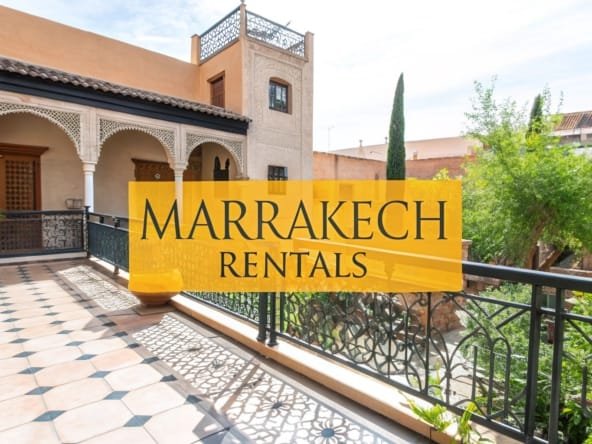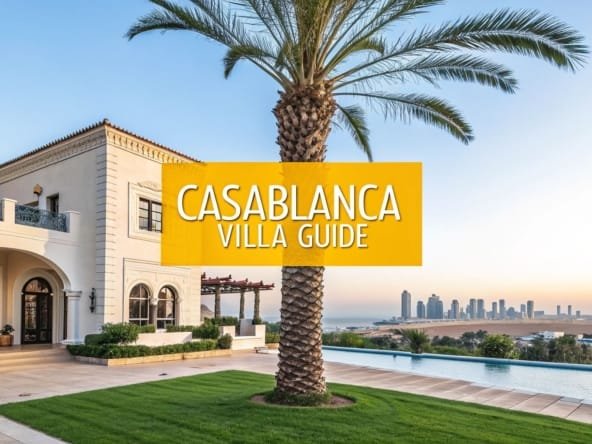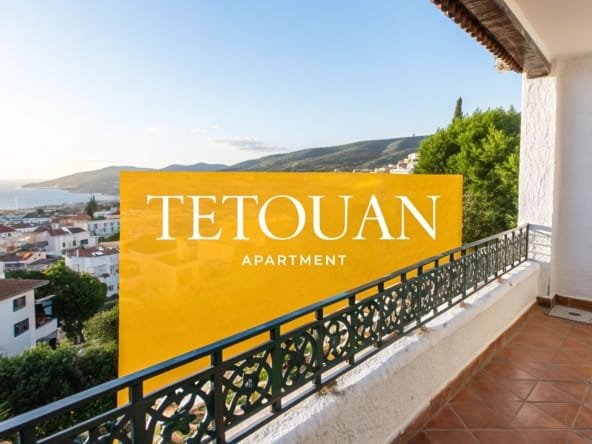So, you’re looking for a maison a vendre a Rabat. It’s a fantastic choice. Finding the right home here is about more than just scrolling through online listings; it’s about getting to grips with one of Morocco's most stable and prestigious property markets. Rabat offers this incredible mix of old-world charm and modern polish, making it a magnet for both homeowners who want a great quality of life and investors seeking real, long-term value.
Getting to Know the Rabat Property Market
Before you jump into your search, it’s crucial to understand what makes Rabat's real estate scene tick. This isn't a market prone to wild swings. Instead, you'll find remarkable stability, a high standard of living, and steady demand from both Moroccans and international buyers. Much of this comes down to its status as the nation's capital, which means it’s home to embassies, major international organisations, and a well-established professional community.
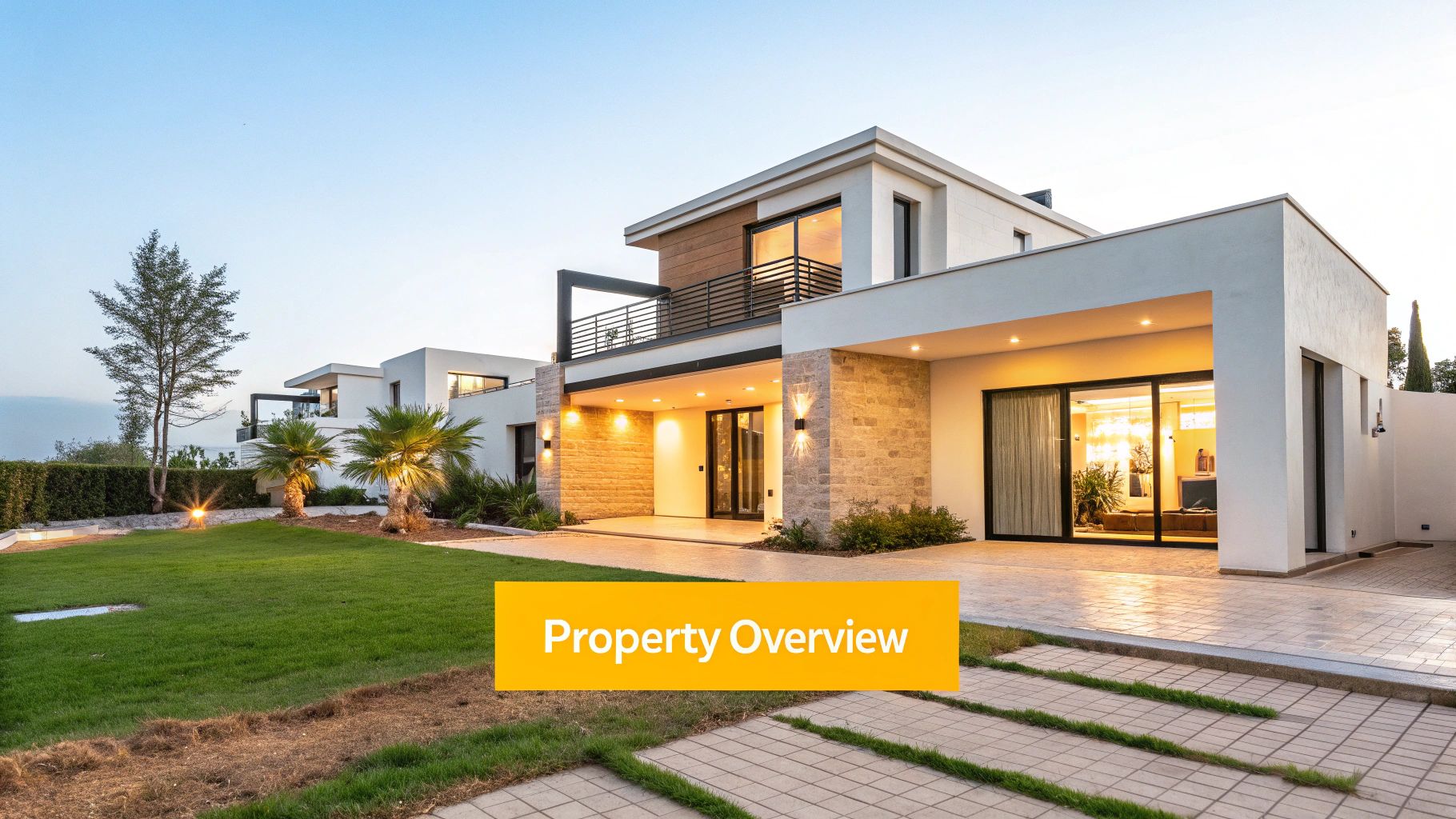
This blend of political importance and economic strength creates a really secure environment for property investment. As a result, the appetite for quality housing is consistently strong, which helps keep property values on a healthy upward trajectory.
What to Expect From Prices and Properties
Having a handle on current prices is the first step to setting a budget that makes sense. In 2025, Rabat's market continues to show a solid appreciation in property values, especially for houses. The average price for villas, for example, is hovering around a firm 20,300 MAD per square metre. That figure alone tells you a lot about the sustained demand and confidence in the market. Apartments have also seen a steady climb, moving from an average of 14,197 MAD/m² in 2024 to 14,500 MAD/m² in 2025. You can dig deeper into these figures and get a feel for the wider Moroccan property scene over at Agenz.ma.
The city serves up a varied menu of properties, each with its own character and price tag:
- Modern Villas: You’ll find these mostly in sought-after neighbourhoods like Hay Riad and Souissi. Think clean lines, private gardens, and swimming pools.
- Traditional Riads: Tucked away closer to the city's historic core, these beautiful homes are built around a central courtyard, offering privacy and an authentic Moroccan lifestyle.
- Contemporary Apartments: Common in the newer districts, these are a fantastic way to get onto the Rabat property ladder, offering modern comforts and convenience.
Here’s something I’ve seen time and again: the price stability in Rabat’s premium neighbourhoods is truly impressive. While city-wide averages are a good guide, exclusive areas like Hay Riad often post an annual appreciation of 3-5%. This makes them a smart choice for anyone looking to protect and grow their capital.
Why Rabat Is an Investor's Dream
The allure of finding a maison a vendre a Rabat goes far beyond just securing a beautiful place to live. Investors are drawn here for some very clear, strategic reasons. The constant flow of diplomats, expats, and senior professionals fuels a robust and dependable rental market, especially for high-end homes.
What does that mean for an owner? Attractive rental yields and low vacancy rates, which add up to a reliable return on your investment. On top of that, the city's carefully managed urban planning helps neighbourhoods keep their exclusive feel and value, avoiding the kind of overdevelopment you might see elsewhere.
Even during global economic slumps, Rabat's market has proven its resilience, cementing its reputation as a safe haven for investment. For anyone serious about building a secure financial future, buying a property here isn't just a purchase—it's a smart, strategic move.
Choosing Your Ideal Rabat Neighbourhood
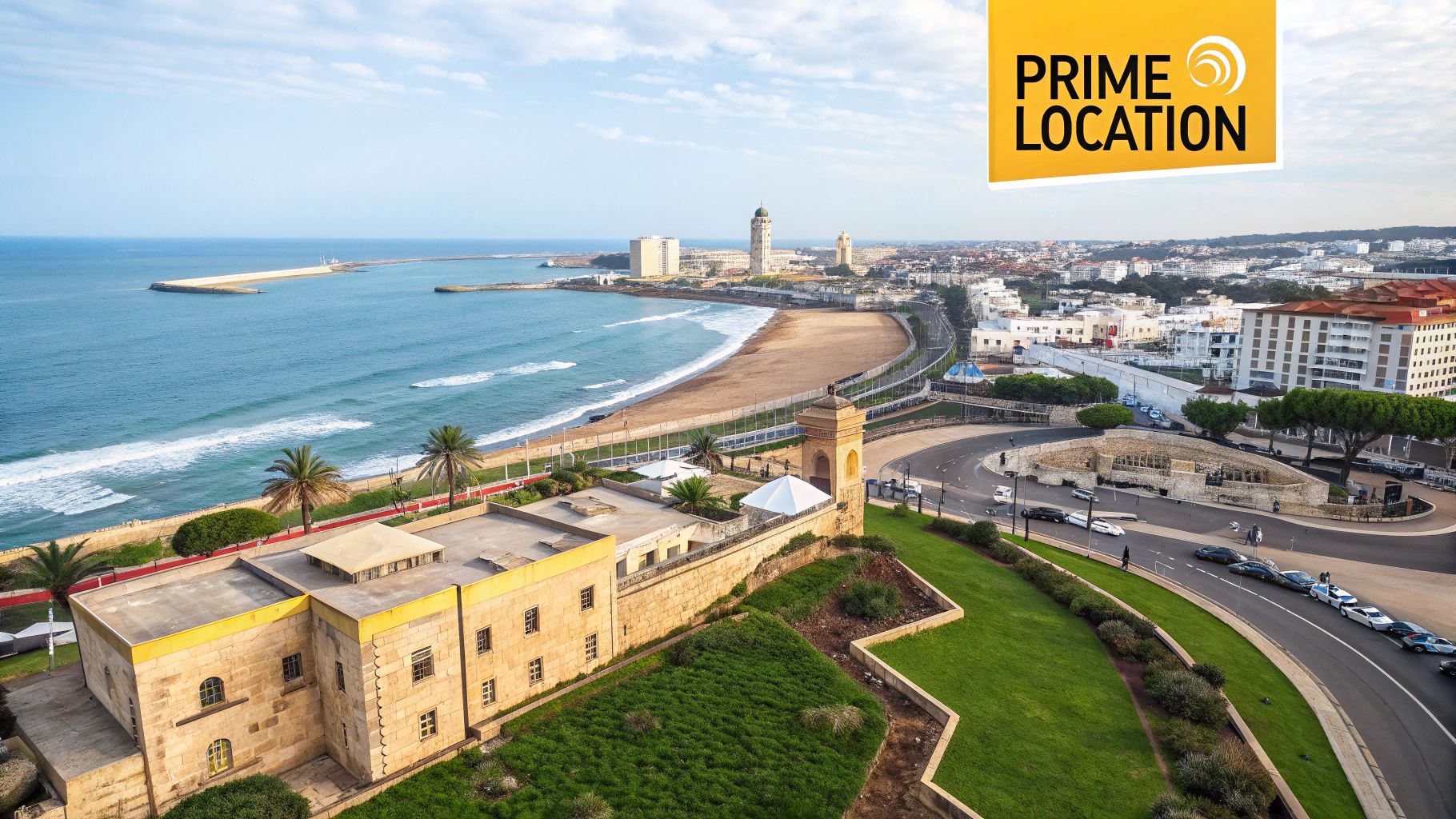
Finding the right spot in Rabat is every bit as crucial as finding the perfect house. The city is a beautiful mosaic of different districts, and each one offers a completely unique way of life. When you start your search for a maison a vendre a Rabat, it’s best to focus on the areas that genuinely align with your life—personally, professionally, and for your family.
This goes way beyond picking a postcode; it's about picturing your day-to-day. Can you see yourself on a quiet, tree-lined street with plenty of room for a growing family? Or does the buzz of a modern district, packed with amenities, feel more like you? Let's get a feel for the character of Rabat’s most sought-after neighbourhoods.
Hay Riad: The Modern and Prestigious Hub
When people talk about upscale living in Rabat, Hay Riad is almost always the first name to come up, and for good reason. It’s a modern, meticulously planned district known for its wide avenues, sleek architecture, and a truly cosmopolitan vibe. This is where you'll find a concentration of embassies, corporate headquarters, and a dynamic community of professionals and expats.
Think of it as Rabat's sophisticated heart, blending business with high-end residential living. The properties here are mainly contemporary villas and premium apartments, often tucked inside secure, gated communities called résidences fermées. These residences frequently come with shared perks like swimming pools, gyms, and beautifully kept common areas, adding a layer of comfort and security.
Living in Hay Riad puts convenience right on your doorstep:
- Top-Tier Education: You’re close to some of the capital's best international schools.
- Modern Amenities: It’s home to upscale shopping centres like Arribat Center, gourmet restaurants, and stylish cafés.
- Recreational Facilities: Premier sports clubs and green spaces are woven right into the neighbourhood's fabric.
The property market here is remarkably solid. A villa in Hay Riad is seen as a blue-chip asset, with prices often appreciating by a steady 3-5% annually. This makes it a go-to for buyers who want not just a superior quality of life, but also a sound, long-term investment.
Souissi: The Epitome of Green and Serene Living
If your dream home involves a sprawling garden, total peace and quiet, and an air of established exclusivity, then Souissi is where you belong. Traditionally seen as Rabat’s most affluent residential area, Souissi is defined by its magnificent villas on large plots, hidden away behind high walls and lush greenery.
The atmosphere here is a world away from Hay Riad. It’s quieter, more spread out, and feels more like a luxurious green suburb, even though it's just a short drive from the city centre. It’s the neighbourhood of choice for many diplomats, long-established Moroccan families, and anyone who puts a premium on privacy and space.
I remember a client who was torn between Hay Riad and Souissi. They loved the modern energy of Hay Riad, but they had two young kids and a dog. After we visited a few properties, the vast, private garden of a Souissi villa sealed the deal. They realised that for their family, having that space to play and relax outdoors was a non-negotiable luxury.
Life in Souissi is all about tranquillity and outdoor living. It’s home to the prestigious Royal Golf Dar Es Salam and the Rabat Zoo, so there's no shortage of things to do on a weekend. While it has fewer commercial hubs than Hay Riad, that residential calm is exactly what makes it so appealing.
Agdal: A Vibrant and Dynamic Mix
Agdal offers a fascinating sweet spot. It's a lively, bustling neighbourhood that brilliantly marries residential comfort with commercial energy. Here, you'll find a blend of older, charming villas and modern apartment buildings, which attracts a diverse mix of university students, young professionals, and families.
Its main artery, Avenue Fal Ould Oumeir, is constantly buzzing with shops, restaurants, and cafés, creating a dynamic atmosphere from morning till night. It's more densely populated and has more of a city-like energy than Souissi or Hay Riad. If you want to be right in the middle of the action with everything you need just a short walk away, Agdal is a fantastic option.
To get a broader perspective on the city's appeal, you might find our guide on why Rabat is Morocco's top real estate destination quite insightful.
Ultimately, choosing between these neighbourhoods boils down to what you value most. Each offers a different flavour of the Rabat lifestyle. Once you define what you're looking for, your search for a maison a vendre a Rabat will become so much more focused and enjoyable.
Navigating Moroccan Property Law and Finances
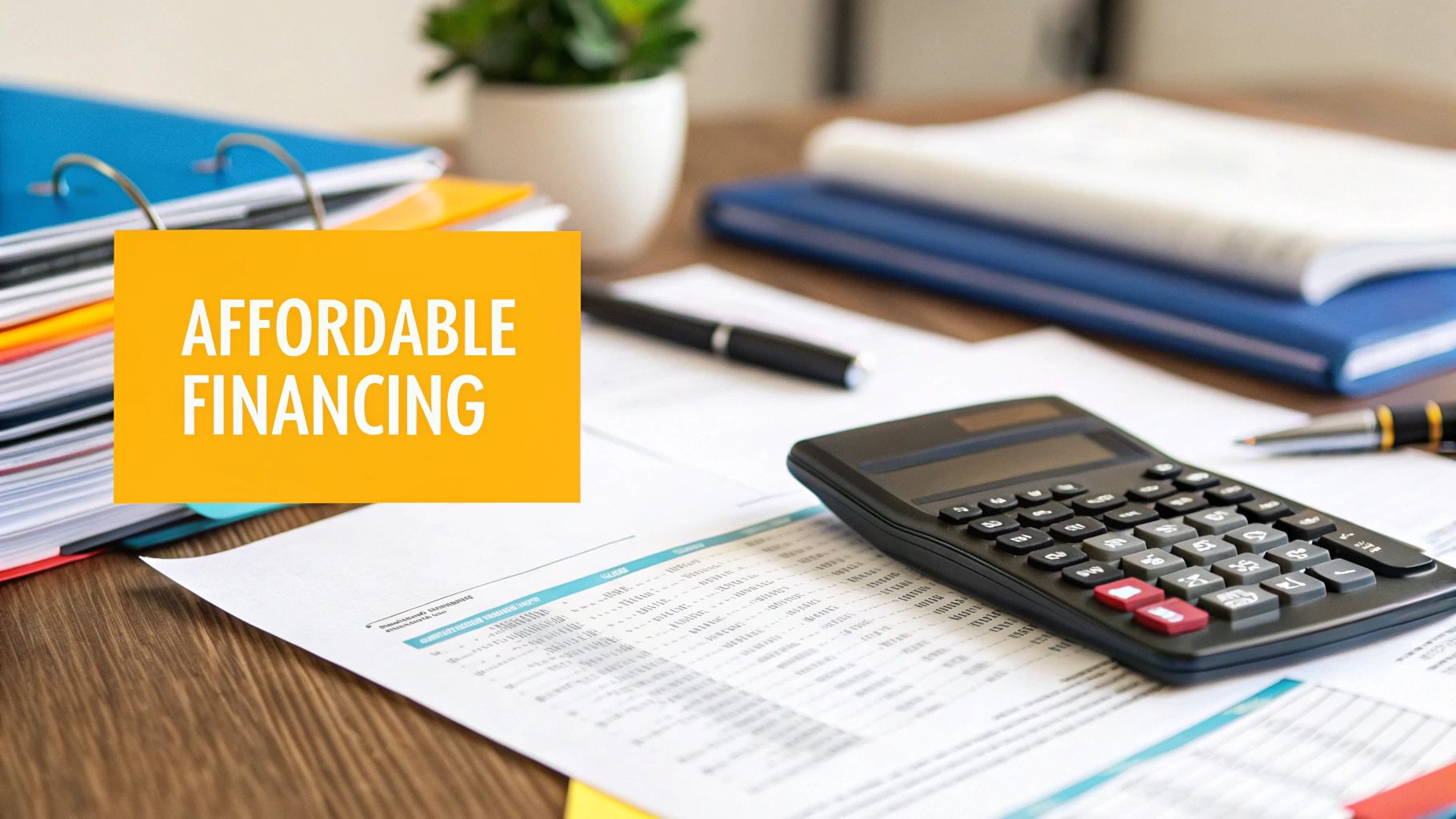
Buying a maison a vendre a Rabat means getting to grips with a set of specific Moroccan legal and financial steps. If you understand this landscape from the start, you're setting yourself up for a much smoother and more secure purchase. Every part of the process, from the central role of the notary to the final closing costs, is there for a reason and needs your attention.
Think of it as a well-defined path designed to protect everyone involved—both you and the seller. By knowing what to expect, you can move forward confidently and sidestep the common hurdles that can trip up unprepared buyers.
The Central Role of the Notaire
In Morocco, the notaire (notary) isn't just a lawyer. They're a public official appointed by the government, acting as a completely neutral third party in the transaction. Their main job is to guarantee the legality of the sale, verify every document, and make sure the funds and ownership are transferred securely.
Honestly, choosing a good notaire is one of the most important decisions you'll make. A trustworthy and experienced one will be your guide through all the legal formalities. They'll handle everything from drafting the first agreement to registering the final deed. Your best bet is to ask for recommendations from your real estate agent or other local contacts who have been through this before.
A good notaire will conduct meticulous due diligence, especially when checking the property's title deed (titre foncier). They confirm the seller is the legal owner and ensure there are no hidden liens, mortgages, or legal disputes tied to the property. This is the bedrock of a secure investment.
Securing Financing for Your Purchase
Unless you're in a position to make a cash purchase, you'll need to look at getting a mortgage from a Moroccan bank. The good news is that banks here lend to both residents and non-resident foreigners, though the specific terms and what they require from you can vary.
You'll almost always need a down payment, or apport personnel, which is typically between 20% to 30% of the property’s price. To apply for a loan, you’ll need to put together a file with:
- Proof of identity and residency
- Evidence of a stable income (payslips, tax returns, employment contract)
- Bank statements from the last three to six months
- A copy of the preliminary sales agreement for the house you want to buy
The approval process can take a few weeks, so it’s smart to start talking to banks early on. This gives you a clear picture of your borrowing power and helps you narrow your search for a maison a vendre a Rabat to a realistic budget. It’s also worth exploring why properties in Morocco are perfect for investment to understand the long-term financial benefits.
Key Legal Documents Explained
The journey to ownership is marked by two crucial legal documents.
First comes the Preliminary Sales Agreement (Compromis de Vente). This is the initial binding contract that lays out all the terms of the sale. It includes the final price, a detailed property description, and any special conditions (clauses suspensives), like the sale being conditional on you securing a mortgage. When you sign this, you'll pay a deposit, usually 5-10% of the purchase price, which the notaire holds in a secure escrow account.
Then, there’s the Final Deed of Sale (Acte de Vente). Once all conditions in the compromis de vente have been met—your mortgage is approved, the final title checks are clear—you’ll sign this definitive deed. This is the document that officially makes you the owner. The notaire then registers the sale with the Land Registry (Conservation Foncière), and you receive your new, official property title.
Budgeting for Closing Costs and Taxes
The sticker price on a house is never the final price. This is crucial. You must budget for a range of additional fees and taxes that can add another 7-10% to the purchase price.
A critical mistake buyers often make is underestimating closing costs. For a 2,000,000 MAD property, these fees can easily amount to 160,000 MAD or more. Always calculate this buffer into your budget from the start to avoid any unwelcome financial surprises at the final signing.
Here’s a quick look at what you can expect to pay:
| Fee or Tax Type | Estimated Cost (% of Purchase Price) | What It Covers |
|---|---|---|
| Registration Duties | 4-6% | A government tax to register the property transfer in your name. |
| Notary Fees | 1-1.5% | This pays for the notaire's professional services and all legal work. |
| Land Registry Fees | 1.5% + fixed charges | Covers the cost of updating the land registry and issuing your new title. |
| Annual Property Taxes | Variable | Includes housing tax (taxe d'habitation) and public services tax. |
The demand for houses in Rabat is influenced by larger economic and social trends shaping Morocco's urban real estate market. According to Bank Al-Maghrib, while the total number of residential transactions dropped by 3.1% year-on-year in Q1 of 2024, property prices in Rabat actually showed resilience, with a nominal increase of 0.2%.
Mastering Your Property Search and Viewings
With your budget set and your ideal neighbourhoods mapped out, the hunt for your maison a vendre a Rabat gets real. This is the exciting part, where research turns into action. A smart, well-organised search will save you precious time and, more importantly, make sure you don't overlook a hidden gem.
Your search will probably kick off on online real estate portals. They're great for getting a feel for what’s out there, letting you filter by price, size, and location. But from my experience, the most successful buyers don't stop there; they blend this digital legwork with the irreplaceable value of professional expertise and local connections.
Building Your Search Team
Let's be clear: partnering with a good local real estate agent, or agence immobilière, is a game-changer. An experienced agent brings so much more to the table than just a list of properties. They have an intimate knowledge of the market, often get access to homes before they're publicly listed, and provide sharp advice when it’s time to negotiate. They know the subtle differences that determine value—why a villa in Souissi might be priced differently from a similar one in Hay Riad, for instance.
At the same time, never underestimate the power of your own network. Tell friends, colleagues, and anyone you know in Rabat that you’re in the market. You'd be surprised how often the best opportunities for a maison a vendre a Rabat come from a casual conversation, long before they hit a public website.
A common mistake I see is buyers putting all their eggs in one basket, usually just one property portal. Some of my clients found their absolute dream home not online, but through a friend-of-a-friend who knew someone thinking of selling. A mix of online tools and real-world networking consistently delivers the best results.
How to Conduct an Effective Property Viewing
Once you’ve got viewings lined up, your mindset has to shift. It's easy to get swept away by a stunning garden or a chic, modern kitchen, but you need to look past the staging. This is your moment to really assess the property's bones and uncover any potential long-term costs.
The best way to do this is to go in with a plan. Seriously, make a checklist. It keeps you focused on what really matters.
The Essential Viewing Checklist
Look beyond the fresh paint and nice furniture. Your mission is to spot any red flags that could turn into expensive headaches later.
- Structural Health: Scan for tell-tale signs of foundation problems. Are there large cracks in the walls (inside or out)? Do the floors feel uneven? Do doors stick or not close properly? These are big warnings.
- Plumbing & Water: Don't be shy. Turn on the taps in the kitchen and every bathroom to check the water pressure. Peek under the sinks for any signs of leaks and check ceilings for water stains.
- Electrical System: Take a look at the electrical panel. Does it look ancient or overloaded? Flip a few light switches and ask how old the wiring is. Old wiring can be a significant expense to replace.
- The Roof & Gutters: While outside, look up. What condition are the roof tiles in? Are the gutters clear and intact? Ask about the roof's age and if there’s a history of leaks.
- Renovation Reality Check: If you're planning to knock down walls, think critically about the layout. Does the current structure even allow for the changes you want without needing major, costly engineering work?
After a successful viewing and an accepted offer, the process becomes more formal. This flowchart breaks down the key legal steps you'll navigate next.
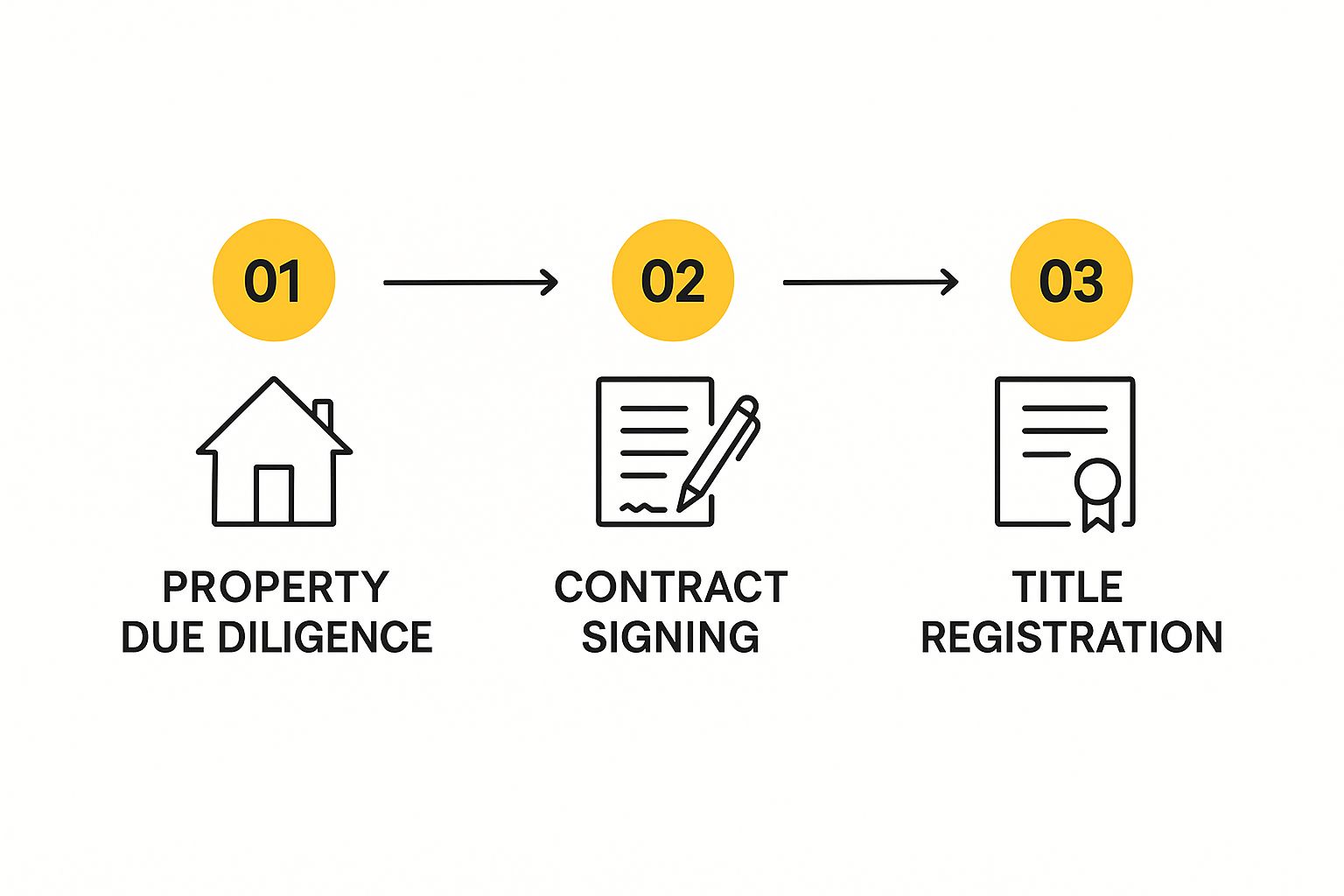
As you can see, once you're satisfied with your viewing, the journey through due diligence and final registration begins.
Finally, ask direct questions. Inquiring about recent repairs, the property's maintenance history, or even why the owner is selling can reveal a lot. A transparent seller or agent should have no problem answering. When you approach each viewing with a critical and methodical eye, you give yourself the power to make a confident and truly informed decision about your future home in Rabat.
Closing the Deal and Taking Possession
So, you’ve navigated the market, explored Rabat’s diverse neighbourhoods, and found the one. That perfect maison a vendre a Rabat. Now, the focus shifts from searching to securing. This is where sharp negotiation, meticulous legal work, and a bit of practical planning come together to get you over the finish line.
The journey from making an offer to holding the keys is a well-trodden path in Morocco, professionally managed by a notaire to protect everyone involved. Knowing what to expect in these final stages is crucial for moving forward with confidence and sidestepping any last-minute headaches.
The Art of a Compelling Offer
Making an offer isn’t just about throwing out a number—it's a strategic move. Your offer needs to be rooted in reality, reflecting the property's condition, its unique location, and what similar homes in the area have recently sold for. A well-researched offer always lands better than one that feels pulled out of thin air.
For instance, if that charming villa you love needs a complete overhaul of its plumbing and electrical systems, your offer can justifiably reflect those future costs. This shows the seller you've done your homework and are making a serious, fact-based proposal. Always put your offer in writing, usually through your agent, and clearly state the price and any conditions.
A pro tip? Get your financing pre-approved before you make an offer. A bid that isn’t conditional on securing a mortgage is incredibly powerful. Sellers often see it as more reliable, which can give you a real edge, even if your offer isn't the absolute highest on the table.
This move signals you're ready to act, and in real estate, that's highly valued. The strength of your position is also tied to the bigger picture. Morocco’s property market, with Rabat as a key hub, is on an upward trajectory. Analysts are projecting a compound annual growth rate (CAGR) of around 4.69% for the total real estate sector between 2024 and 2029. Residential property alone is forecasted to grow by nearly 5% each year. You can learn more by checking out the investor's playbook to Morocco's real estate gold rush.
Final Steps with the Notaire
Once your offer is accepted, the notaire takes the lead. Think of them as the director of the final act, ensuring every legal detail is buttoned up before ownership officially changes hands. This whole process builds up to the signing of the definitive deed, the 'acte de vente'.
This signing is a formal meeting where you, the seller, and the notaire gather. The notaire will read the entire deed aloud to make sure everyone is on the same page. This is your absolute last chance to ask any questions. Once you sign, you'll transfer the remaining funds for the purchase, which the notaire holds securely.
Securing Your Property Title
The single most important document you’ll receive from this whole process is a clear property title, known in Morocco as the 'titre foncier'. This is the official, undeniable proof of your ownership, registered with the Moroccan Land Registry (Conservation Foncière).
Your notaire handles this from start to finish. They conduct one last, exhaustive check to confirm the property is completely free of any liens, mortgages, or other claims (known as hypothèques). After the 'acte de vente' is signed and the money has been transferred, the notaire submits all the paperwork to the land registry to get the title officially put into your name. It can take a few weeks, but once it’s done, you'll get your certified copy of the new title deed.
The Practicalities of Taking Possession
With the legal side wrapped up, the final step is the handover. It's an exciting moment, but a few practical tasks are essential to make your move-in seamless.
- The Key Handover: This is usually arranged with the seller or their agent for right after the final signing. For your own peace of mind, it’s always a good idea to have the locks changed shortly after you move in.
- Utility Transfers: You'll need to get the electricity, water, and internet services transferred into your name. This means a trip to the local offices of providers like Redal (for water and electricity in Rabat), armed with your 'acte de vente' and ID.
- Final Walk-Through: Once the sellers have moved all their belongings out, do one last walk-through of the property. You want to make sure everything is in the condition that was agreed upon in your contract.
Tackling these details quickly will make sure your transition into your new Rabat home is as smooth and enjoyable as it should be.
Common Questions About Buying a Home in Rabat
Even the most prepared buyer will have questions when looking for a maison a vendre a Rabat. It's only natural. Getting answers to these common queries upfront gives you the confidence you need, especially if you're new to the Moroccan property scene.
Let's walk through some of the most frequent questions I hear from both local and international clients. Think of this as getting the small but important details sorted, so you're ready for every stage of the journey.
Can Foreigners Legally Buy Property in Rabat?
Yes, absolutely. Morocco makes it quite simple for non-citizens to purchase residential property in its cities. Foreigners can own houses, villas, and apartments in urban zones like Rabat with the exact same rights as Moroccan nationals. It’s one of the reasons Rabat has become such a welcoming place for international buyers and investors.
The main thing to keep in mind is the restriction on agricultural land—foreigners aren't permitted to own it. But if you're searching for a home in the city, this won't be an issue. Urban properties are almost always "titled land" (titre foncier), which is completely open to foreign ownership.
A crucial tip for international buyers: make sure you properly document the funds you bring into Morocco for the purchase. If you ever want to sell the property and send the money back home, you'll need proof that the initial investment came from abroad through official banking channels. Your notaire is the best person to guide you on this.
What Are the Main Taxes Involved in a Purchase?
When you’re setting your budget, remember that the final number is more than just the price tag on the house. You need to account for several taxes and fees that are part of the closing costs. Knowing these in advance prevents any last-minute financial stress.
Here’s a breakdown of the main costs you can expect:
- Registration Duty: This government tax on the property transfer usually lands around 4-6% of the sale price.
- Notary Fees: For the notaire's essential legal work, budget about 1-1.5% of the property's value.
- Land Registry Fees: To officially register your ownership, you'll pay roughly 1.5%, plus a few small fixed charges.
After you've become a homeowner, you'll also have annual property taxes to consider. This includes the housing tax (taxe d'habitation) and a public services tax (taxe de services communaux), which are both based on the property's assessed rental value.
How Long Does the Buying Process Typically Take?
Patience is key here. From the moment you sign the preliminary sales agreement (compromis de vente) to getting the keys in hand with the final deed (acte de vente), the entire process generally takes between one and three months.
What makes it vary? A few things. If you're getting a mortgage, the bank's underwriting and approval process can easily add a few weeks. The workload of your notaire and the time they need to perform all the necessary legal checks on the property's title also play a big part.
If you're weighing your options, our overview on the sale of apartments in Rabat might offer a useful comparison. The best approach is to talk with your agent and notaire early on to set a realistic timeline together.
At Rich Lion Properties, our goal is to give you the clarity and expert guidance you need to feel secure in your property journey. Explore our services and let us help you find your ideal home in Rabat with confidence.

